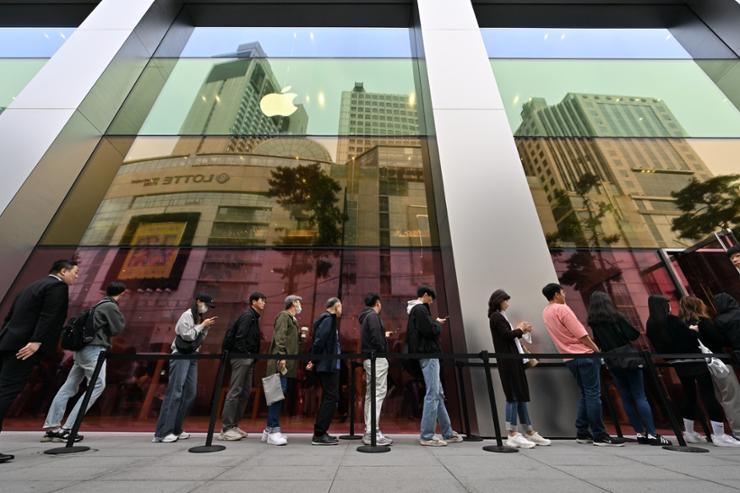Customers who preordered Apple’s iPhone 15 queue at an Apple Store in Seoul, Oct. 13, 2023. Korea Times photo by Choi Joo-yeon
Stable fan base, weakening Chinese demand presumed to affect Apple
By Nam Hyun-woo
Expectations are growing among Apple users in Korea as rumors suggest that Korea could be among the first regions for the iPhone 16 launch. If true, this would mark the first time since the iPhone 3GS debuted in 2009 that Korea is included in the initial-release countries for a new iPhone model.
According to U.S. media outlets, including Forbes and 9to5Mac, Apple is expected to hold an event to debut its newest iPhone in the middle of next month, with Sept. 10 being the most likely date based on Apple’s previous release day patterns.
Korean mobile carriers are not confirming whether the country is included in the list of first-release countries. However, several Korean media outlets have reported the early release as confirmed, citing unidentified sources.
“Due to Apple’s strategy of keeping communication minimal with its partners, telecom companies are not able to confirm the release date until Apple makes an official announcement,” an industry official said on condition of anonymity.
“However, preparations are being made to be ready whenever the new iPhone is released.”
Another industry official said it “remains at the stage of a likely rumor so far,” and add it is “hard to predict until the very last announcement, given Apple’s confidentiality policies.”

Customers queue to receive iPhone 3GS smartphones during a launch event at Jamsil Arena in Seoul, Nov. 28, 2009, when the iPhone was first launched in Korea. Korea Times file
Despite the iPhone series’ steadfast market share in Korea, Apple has historically released its new models in Korea weeks after its debut in other markets, leading to complaints from Apple enthusiasts here.
The delayed release has long been attributed to Apple’s strong confidentiality policies coupled with Korea’s certification system.
In Korea, all electronic devices are required to be certified by the National Radio Research Agency, and information on such devices is disclosed through the agency’s website. This means that the new iPhone’s specs and other details can be leaked before Apple’s announcement, prompting the U.S. company to sideline Korea from initial releases. In contrast, regions like Europe and Japan do not require separate radio certification as they have mutual recognition agreements with the United States.
Despite those difficulties, Apple appears to be considering Korea’s inclusion into its list of first-release countries, given the steady demand among loyal users.
“These days, the Korean market is serving a role of a testbed for global brands, as its consumers are sensitive to trending items and do not hesitate to spend their money on goods they feel are valuable,” a telecom company official said.
“With the iPhone maintaining its market share, particularly among young Koreans, it seems more advantageous for Apple to release its new models in the Korean market and use positive early sales here as a marketing tool.”
According to data from market tracker Counterpoint Research, Apple accounted for 24 percent in the first quarter of this year, following Samsung Electronics with 75 percent. In the research, Apple’s market share has shown noticeable improvements for every fourth quarter, when the new iPhone release in September is reflected in the data.

Customers look at the iPhone 15 series at an Apple Store in Seoul, Oct. 13, 2023. Korea Times photo by Choi Joo-yeon
“It seems like Apple has now reached a conclusion that it is maintaining consumer preferences in the Korean market, and that means it could be reasonable for the company to consider early sales marketing here and bring positive impact on its global sales campaign,” another telecom company official said.
“Also, it is speculated that declining iPhone demand in the Chinese market might be a factor allowing Apple to allocate more iPhones for early release to Korea.”
According to market tracker Canalys, Apple’s market share shrank to 14 percent in the second quarter of this year, down from 16 percent a year earlier. This edged the company out of the top five smartphone vendors list in China.
While the iPhone 16 could be the first model Apple launches early in Korea, domestic telecom companies believe this early release is unlikely to significantly impact their sales.
“For the perspective of selling mobile devices, launching phones after releases in overseas markets is more advantageous because chances are high that early problems are already solved when we introduce devices in the Korean market,” the second telecom company official said, citing Apple’s 2010 Antennagate scandal.


